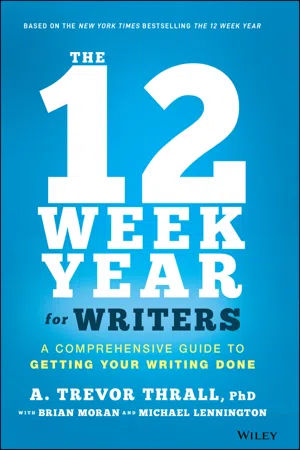
The 12 Week Year for Writers
A Comprehensive Guide to Getting Your Writing Done
- English
- ePUB (mobile friendly)
- Available on iOS & Android
The 12 Week Year for Writers
A Comprehensive Guide to Getting Your Writing Done
About this book
Get more words on the page with this proven and popular system
The 12 Week Year for Writers: A Comprehensive Guide to Getting Your Writing Done is an easy-to-implement and practical framework for writers to get more work done in less time. You'll answer big picture questions—What is my vision for the future? What are my writing goals?—while enacting a comprehensive system to plan and execute your writing.
You'll create a 12 Week Plan and a Model Week, collaborate with a weekly writing group, keep score, and learn to stick to a weekly execution routine. The book will also show you how to:
- Manage multiple writing projects at the same time
- Develop a prolific writer's mindset and increase your output with the 12 Week Year system
- Deal with actionable specifics, like when and where to write
Ideal for writers in all genres and fields, The 12 Week Year for Writers is the perfect hands-on guide for academic and business writers, authors, students, columnists, bloggers, and copy and content writers who seek to increase their productivity and get more quality words on the page.
Frequently asked questions
- Essential is ideal for learners and professionals who enjoy exploring a wide range of subjects. Access the Essential Library with 800,000+ trusted titles and best-sellers across business, personal growth, and the humanities. Includes unlimited reading time and Standard Read Aloud voice.
- Complete: Perfect for advanced learners and researchers needing full, unrestricted access. Unlock 1.4M+ books across hundreds of subjects, including academic and specialized titles. The Complete Plan also includes advanced features like Premium Read Aloud and Research Assistant.
Please note we cannot support devices running on iOS 13 and Android 7 or earlier. Learn more about using the app.
Information
SECTION II
HOW TO USE THE 12 WEEK YEAR
CHAPTER 3
CRAFTING YOUR WRITING VISION
CRAFTING YOUR VISION
- - Craft your long-term, aspirational vision
- - Craft your near-term vision, roughly one to three years into the future
- - Craft your writing vision
- - Identify your next writing project
ASPIRATIONAL VISION
ACTION STEP: CRAFT YOUR ASPIRATIONAL VISION
Table of contents
- COVER
- TABLE OF CONTENTS
- TITLE PAGE
- COPYRIGHT
- PREFACE
- ACKNOWLEDGMENTS
- LIST OF ACTION STEPS
- SECTION I: WHY YOU NEED A NEW WRITING SYSTEM
- SECTION II: HOW TO USE THE 12 WEEK YEAR
- SECTION III: HOW THE 12 WEEK YEAR WILL HELP YOU WRITE
- SECTION IV: THE 12 WEEK YEAR IN ACTION
- FREE 12 WEEK YEAR FOR WRITERS RESOURCE LIBRARY
- End User License Agreement